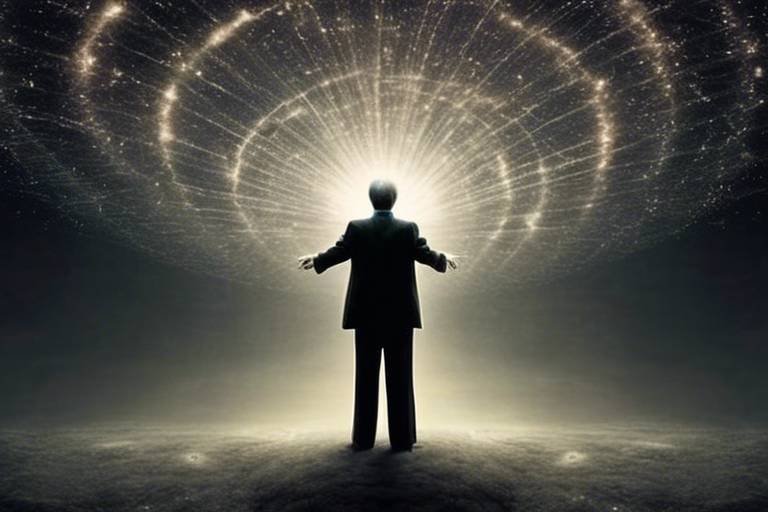The Relationship Between Ontology and Metaphysics
In the vast landscape of philosophy, ontology and metaphysics stand as two towering pillars that support our understanding of reality. But what exactly connects these two fields? To put it simply, ontology is the study of being and existence, while metaphysics delves into the fundamental nature of reality itself. Imagine ontology as the map that outlines the territory of existence, while metaphysics is the exploration of the terrain beyond the map's edges. Together, they form a comprehensive framework that helps us navigate the complexities of life, existence, and everything in between.
Understanding the relationship between ontology and metaphysics is crucial for anyone interested in philosophical discourse. They are not just abstract concepts; they are deeply intertwined, influencing each other in ways that shape our perceptions of reality. For instance, when we ask questions about what it means to exist, we are engaging in ontological inquiry. Conversely, when we ponder the nature of reality and the universe, we are venturing into metaphysical territory. This interplay raises intriguing questions: Are the entities we discuss in ontology real? How do our ontological commitments affect our metaphysical beliefs? These questions highlight the importance of distinguishing yet connecting these two domains.
Throughout history, philosophers have grappled with these concepts, leading to various interpretations and theories. From Aristotle's foundational ideas about substance and essence to Heidegger's existential inquiries, the evolution of ontology has been rich and complex. Similarly, metaphysics has seen significant shifts, particularly in response to scientific advancements and philosophical critiques. Understanding their historical context can provide valuable insights into contemporary debates and discussions. It’s fascinating to see how these two branches of philosophy have not only evolved independently but have also influenced each other over time.
Moreover, the relevance of ontology and metaphysics extends beyond philosophy into other disciplines. In science, for example, the ontological status of entities like particles and forces can influence theoretical frameworks. In theology, metaphysical questions about the nature of God and existence can shape religious beliefs and practices. This interdisciplinary connection illustrates that ontology and metaphysics are not just academic exercises; they have practical implications that resonate in various aspects of life.
As we explore the intricate relationship between ontology and metaphysics, it becomes clear that they are essential for a deeper understanding of reality. They challenge us to think critically about existence, the nature of the universe, and our place within it. This exploration is not merely an intellectual pursuit; it invites us to reflect on our beliefs, assumptions, and the very fabric of our understanding. So, as we delve deeper into these philosophical realms, let’s keep in mind the questions they raise and the insights they offer.
- What is the main difference between ontology and metaphysics?
Ontology focuses specifically on the nature of being and existence, while metaphysics encompasses a broader inquiry into the fundamental nature of reality, including questions about existence, objects, and their properties. - Why are ontology and metaphysics important in philosophy?
They provide foundational frameworks for understanding reality, influencing various disciplines and shaping our beliefs about existence and the universe. - How do ontology and metaphysics relate to other fields like science and theology?
Both fields inform and influence scientific theories about existence and reality, as well as theological discussions regarding the nature of God and existence.

Defining Ontology
Ontology, at its core, is a fascinating branch of philosophy that dives deep into the nature of being and existence. Imagine standing at the edge of a vast ocean, where each wave represents a different entity or concept. Just as the ocean is made up of countless drops of water, ontology examines the myriad of entities that populate our reality. It seeks to answer profound questions such as: What does it mean to exist? What kinds of things exist? And how do these entities relate to one another?
One of the key concepts in ontology is the distinction between entities and their properties. Entities can be anything from tangible objects like trees and cars to abstract concepts like love and justice. Properties, on the other hand, are the characteristics that define these entities. For instance, a tree may possess properties such as height, color, and age. Understanding this relationship helps us grasp the complexity of existence itself.
Ontology also explores different categories of being. These categories can be broadly classified into two types: concrete entities (those that physically exist) and abstract entities (those that do not have a physical presence). This distinction is crucial because it allows philosophers to categorize and analyze the various aspects of reality. For example, while a chair is a concrete entity that you can sit on, the concept of 'justice' is abstract and exists only in thought.
Furthermore, ontology is not just a theoretical endeavor; it has practical implications in various fields such as computer science, linguistics, and artificial intelligence. In these domains, ontological frameworks help in organizing knowledge and creating systems that can understand and process information about the world. For instance, in AI, ontologies are used to define the relationships between different concepts, enabling machines to reason and make decisions more effectively.
In summary, ontology is a rich and complex field that lays the groundwork for understanding existence. By examining entities and their properties, we can begin to unravel the intricate tapestry of reality. As we delve deeper into this subject, we will uncover how ontology interplays with metaphysics, further enriching our philosophical discourse.

Understanding Metaphysics
Metaphysics, often regarded as the backbone of philosophical inquiry, dives deep into the fundamental nature of reality. It’s like peeling back the layers of an onion, revealing the essence of existence itself. At its core, metaphysics seeks to answer some of the most profound questions we can ponder: What is existence? What does it mean for something to be? Are objects real, or are they merely constructs of our perception?
To grasp metaphysics, we must first understand its two primary branches: ontology and cosmology. Ontology, as we explored earlier, focuses on the nature of being, while cosmology deals with the origins and structure of the universe. Together, they create a comprehensive landscape for understanding reality. Think of metaphysics as a vast ocean, with ontology and cosmology serving as its waves, constantly interacting and shaping our understanding of existence.
One of the key concepts in metaphysics is the distinction between substance and attribute. Substance refers to what something is—its core essence—while attributes describe its properties or characteristics. For instance, consider a tree: its substance is the tree itself, while its attributes include height, color, and type of leaves. This distinction is crucial as it helps us navigate through the complexities of reality, allowing us to categorize and understand the myriad entities that populate our world.
Another fascinating aspect of metaphysics is the exploration of causality. Causality examines the relationship between cause and effect, raising questions like: What causes an event to occur? Is there a first cause that set everything in motion, or is the universe a series of interconnected events without a singular origin? These inquiries not only challenge our understanding of time and space but also invite us to consider the implications of free will versus determinism. Are we merely puppets dancing to the strings of fate, or do we have the power to shape our own destinies?
Moreover, metaphysics often intersects with other disciplines, such as science and theology. For instance, physicists grapple with metaphysical questions when they explore the nature of time and the fabric of the universe. Similarly, theologians delve into metaphysical discussions when contemplating the existence of a higher power or the nature of the soul. This intersection enriches both fields, creating a dialogue that fuels further inquiry and understanding.
As we navigate through the labyrinth of metaphysical concepts, it’s essential to recognize that metaphysics is not merely an abstract discipline. It has practical implications in our daily lives. Our beliefs about reality shape our actions, decisions, and interactions with others. Understanding metaphysics can lead to a more profound comprehension of ourselves and the world around us, allowing us to engage with life in a more meaningful way.
In summary, metaphysics serves as a crucial framework for understanding the fundamental nature of reality. By exploring concepts like substance, causality, and the intersections with other fields, we gain insight into not just what exists, but why it exists. This exploration invites us to question our assumptions, challenge our perceptions, and ultimately, seek a deeper understanding of the universe and our place within it.
- What is metaphysics? Metaphysics is a branch of philosophy that investigates the fundamental nature of reality, including concepts such as existence, objects, and their properties.
- How does metaphysics relate to ontology? Ontology is a subfield of metaphysics that specifically focuses on the nature of being and existence.
- Why is metaphysics important? Metaphysics provides a framework for understanding reality, influencing various fields such as science, theology, and ethics.
- Can metaphysical questions be answered? While some metaphysical questions may remain unanswered, they encourage critical thinking and deeper exploration of our understanding of reality.

The Historical Development of Ontology
Ontology has a rich and intricate history that stretches back to the roots of Western philosophy. Its evolution is akin to a grand tapestry, woven from the thoughts and ideas of various philosophers who sought to understand the essence of being and existence. The journey begins in ancient Greece, where philosophers like Parmenides and Heraclitus laid the groundwork for ontological inquiry. Parmenides famously asserted that "being is," suggesting a static, unchanging reality, while Heraclitus countered with the idea that change is the fundamental essence of existence. This dialectical tension set the stage for deeper explorations of what it means to exist.
As we move forward in time, the contributions of Aristotle cannot be overlooked. In his seminal work, "Metaphysics," Aristotle introduced the concept of substance, which he defined as that which exists independently and serves as the foundation for all entities. His classification of beings into categories laid the groundwork for future ontological frameworks. Aristotle's influence permeated the Middle Ages, where scholars like Thomas Aquinas integrated Aristotelian thought with Christian theology, further enriching the ontological discourse.
The Renaissance sparked a revival of interest in ontology, as thinkers began to question established norms and explore the nature of reality through a more scientific lens. René Descartes, with his famous dictum "Cogito, ergo sum" ("I think, therefore I am"), shifted the focus of ontology from external reality to the individual’s consciousness, positing that existence is inherently linked to thought. This introspective approach paved the way for modern philosophy.
Fast forward to the 19th and 20th centuries, where Heidegger profoundly impacted ontology by emphasizing the importance of "being" itself. His work, "Being and Time," challenged previous ontological assumptions and introduced the notion of Dasein, or "being-there," which highlights the significance of human existence in understanding ontology. Heidegger's existential approach prompted a reevaluation of how we perceive existence, urging philosophers to consider the existential conditions that shape our understanding.
In contemporary philosophy, ontology has branched into various theories. Realism posits that entities exist independently of our perceptions, while nominalism argues that universals are merely names without real existence. These modern ontological theories reflect the ongoing quest to comprehend existence in an increasingly complex world.
To summarize the historical development of ontology, we can look at the following table, which outlines key philosophers and their contributions:
| Philosopher | Key Contribution | Era |
|---|---|---|
| Parmenides | Proposed the idea that "being is" | Ancient Greece |
| Aristotle | Introduced the concept of substance | 4th Century BCE |
| Thomas Aquinas | Integrated ontology with Christian theology | Middle Ages |
| René Descartes | Emphasized the link between thought and existence | 17th Century |
| Martin Heidegger | Developed the concept of Dasein | 20th Century |
The historical development of ontology is not merely a timeline of ideas; it is a reflection of humanity's enduring quest to understand the very fabric of reality. Each philosopher has added a unique thread to this tapestry, enriching our comprehension of existence and inviting us to ponder the profound questions that lie at the heart of being.
- What is ontology? Ontology is the branch of philosophy that studies the nature of being, existence, and the categories of being.
- How does ontology differ from metaphysics? While ontology focuses specifically on the nature of existence, metaphysics encompasses broader questions about reality, including the nature of objects and their properties.
- Who are some key figures in the history of ontology? Key figures include Parmenides, Aristotle, Thomas Aquinas, René Descartes, and Martin Heidegger.

Key Philosophers in Ontology
When we think about the evolution of ontology, it’s impossible to overlook the profound contributions of several key philosophers. These thinkers have not only shaped our understanding of existence but have also paved the way for contemporary discussions in the field. One of the earliest and most influential figures in ontology is Aristotle. His work, particularly in "Metaphysics," laid the groundwork for many ontological inquiries. Aristotle introduced the concept of substance, arguing that substances are fundamental entities that exist independently. He categorized beings into different types, emphasizing the importance of essence and existence. This distinction between potentiality and actuality is crucial for understanding how entities come into being and how they exist in the world.
Moving forward in time, we encounter Immanuel Kant, who revolutionized ontology with his critical philosophy. Kant proposed that our understanding of reality is shaped by the structures of our mind, suggesting that we cannot know things as they are in themselves, but only as they appear to us. This idea challenged traditional notions of ontology by introducing the concept of phenomena versus noumena, highlighting the limitations of human perception. His work prompted a reevaluation of how we conceive existence and the nature of being.
Another pivotal figure is Martin Heidegger, who brought a unique existential perspective to ontology. In his seminal work "Being and Time," Heidegger explored the question of Being itself, arguing that understanding existence is fundamentally linked to human experience. He introduced the term "Dasein," which refers to the experience of being that is specific to humans. Heidegger's focus on temporality and the situatedness of beings has deeply influenced contemporary ontological discussions, encouraging philosophers to consider the context in which entities exist.
In contemporary philosophy, we also see the emergence of W.V.O. Quine, who challenged traditional ontological categories with his famous dictum, "To be is to be the value of a bound variable." Quine's work questioned the distinction between analytic and synthetic truths, suggesting that our ontological commitments should be based on our best scientific theories. This pragmatic approach has reshaped the landscape of ontology, leading to debates about realism and nominalism.
Finally, we cannot overlook the contributions of Gottlob Frege, who laid the foundations for modern logic and its implications for ontology. Frege's distinction between sense and reference has had lasting effects on how philosophers approach the existence of abstract objects. His work has opened up discussions about the nature of mathematical entities and their place in ontological frameworks.
In summary, the lineage of ontological thought is rich and diverse, shaped by the ideas of these key philosophers. Their contributions have not only clarified our understanding of existence but have also sparked ongoing debates that continue to resonate in philosophical circles today. Each philosopher, with their unique perspectives and theories, has added layers of complexity to the fundamental questions surrounding being and existence.

Modern Ontological Theories
In the realm of modern philosophy, ontological theories have evolved into a rich tapestry of ideas that challenge our understanding of existence. Today, we find ourselves navigating through a myriad of perspectives that reflect the complexities of our world. At the heart of these theories are two dominant schools of thought: realism and nominalism. Each presents a unique lens through which we can examine the nature of being and the properties of entities.
Realism posits that entities exist independently of our perceptions or categorizations. Think of it as a steadfast tree standing tall in a forest, regardless of whether anyone is there to admire it. Realists argue that universals—like properties or qualities—are real and exist outside of the individual instances we encounter. For instance, the color red exists not just in a rose or a fire truck but as a universal quality that can be found in various objects. This perspective emphasizes the objective nature of reality and asserts that our understanding of it is grounded in something beyond mere human experience.
On the other hand, nominalism challenges this notion, suggesting that universals are merely names or labels we use to categorize our experiences. Imagine you're at a buffet, and all the dishes are labeled. The labels help you make sense of what you're seeing, but they don’t represent any independent reality. Nominalists argue that the categories we create are useful tools for communication but do not reflect any inherent essence of the objects themselves. This theory raises intriguing questions about the nature of existence and whether our classifications truly capture the essence of reality.
Another important contemporary ontological theory is existentialism, which emphasizes individual existence, freedom, and choice. Think of existentialism as a blank canvas, where each person is both the artist and the artwork. This perspective argues that existence precedes essence, meaning that individuals first exist and then define themselves through their actions and choices. Prominent figures like Jean-Paul Sartre and Simone de Beauvoir have contributed significantly to this discourse, prompting us to reflect on our own existence and the responsibilities that come with it.
Moreover, structuralism and post-structuralism have also made significant contributions to modern ontology. Structuralism views reality as a complex system of interrelated structures, suggesting that understanding these structures is essential to grasping the essence of existence. In contrast, post-structuralism challenges the idea of fixed meanings and structures, advocating for a more fluid understanding of reality that acknowledges the influence of context and interpretation. This philosophical shift invites us to reconsider our assumptions about the nature of being and the frameworks we use to understand it.
In summary, the landscape of modern ontological theories is diverse and multifaceted. From realism's assertion of an independent reality to nominalism's focus on the significance of language and categorization, each theory offers valuable insights into the nature of existence. Existentialism, structuralism, and post-structuralism further enrich this discourse, encouraging us to explore the complexities of our own being and the world around us. As we delve deeper into these theories, we uncover layers of meaning that not only inform our philosophical inquiries but also resonate with our everyday experiences.
- What is the main difference between realism and nominalism?
Realism asserts that universals exist independently of our perception, while nominalism claims that universals are merely names or labels that we use to categorize our experiences. - How does existentialism relate to ontology?
Existentialism emphasizes individual existence and the freedom to define oneself, suggesting that existence precedes essence. This perspective invites personal reflection on what it means to be. - What role do structuralism and post-structuralism play in modern ontology?
Structuralism views reality as a system of interrelated structures, while post-structuralism challenges fixed meanings, promoting a more fluid understanding of existence based on context and interpretation.

The Historical Development of Metaphysics
Metaphysics, often regarded as the backbone of philosophical inquiry, has undergone significant transformations since its inception in ancient times. It began with the early Greek philosophers, who were deeply curious about the nature of reality and existence. Thinkers like Thales and Anaximander sought to understand the fundamental substances that make up the universe, laying the groundwork for what would eventually evolve into metaphysical thought.
As we journey through history, we encounter Plato, who introduced the concept of the Forms, proposing that non-material abstract forms represent the most accurate reality. This dualistic approach to existence sparked vibrant discussions among his followers and later philosophers. Plato's student, Aristotle, took a different route, emphasizing empirical observation and categorizing reality in terms of substances and their properties. His work, particularly in "Metaphysics," solidified the term and the field itself, shaping the discourse for centuries.
The medieval period saw metaphysics intertwined with theology, as scholars like St. Augustine and St. Thomas Aquinas sought to reconcile faith with reason. Their work emphasized the existence of a divine being and the nature of existence itself, leading to a rich tapestry of metaphysical thought that addressed both spiritual and existential questions. This era highlighted the importance of divine causality in understanding the universe, making metaphysics a crucial component of theological discourse.
As we moved into the Renaissance, metaphysics experienced a revival, influenced by the rediscovery of classical texts and the burgeoning scientific revolution. Thinkers such as René Descartes introduced a new approach, emphasizing doubt and skepticism as tools for establishing knowledge. His famous dictum, "Cogito, ergo sum" (I think, therefore I am), shifted the focus from external realities to the individual's consciousness, sparking debates that would shape modern philosophy.
The Enlightenment brought further developments, with philosophers like Immanuel Kant challenging traditional metaphysical frameworks. Kant argued that our understanding of reality is shaped by our perceptions, leading to the distinction between the noumenal (the thing-in-itself) and the phenomenal (the thing as experienced). This pivotal shift questioned the very foundations of metaphysics, suggesting that human cognition limits our grasp of ultimate reality.
In the 19th and 20th centuries, metaphysical thought continued to evolve, with movements such as existentialism and phenomenology emerging as reactions to earlier frameworks. Philosophers like Martin Heidegger and Jean-Paul Sartre focused on existence, freedom, and the human condition, posing new questions about being and reality. Their works challenged traditional metaphysical concepts, emphasizing subjective experience over objective reality.
Today, metaphysics remains a vibrant field, engaging with contemporary issues like the nature of time, space, and consciousness. It has expanded to include discussions on the implications of modern physics and the philosophy of mind, making it not only a historical inquiry but a relevant aspect of ongoing philosophical dialogue. The journey of metaphysics is a testament to humanity's relentless quest for understanding, reflecting our desire to grasp the essence of existence itself.
- What is metaphysics? Metaphysics is a branch of philosophy that explores the fundamental nature of reality, including concepts such as existence, objects, and their properties.
- How has metaphysics evolved over time? Metaphysics has evolved from ancient Greek philosophy through medieval theology, the Enlightenment, and into modern discussions, adapting to new philosophical challenges and scientific discoveries.
- Who are some key figures in the history of metaphysics? Important figures include Plato, Aristotle, Descartes, Kant, Heidegger, and Sartre, each contributing unique perspectives to metaphysical thought.

Comparing Ontology and Metaphysics
When we dive into the worlds of ontology and metaphysics, it’s like stepping into a philosophical playground where the rules of existence and reality are constantly being explored and challenged. At first glance, these two branches of philosophy might seem like they are dancing to the same tune, but as we examine them more closely, we uncover the subtle yet profound differences that set them apart.
Ontology is primarily concerned with the nature of being and what it means for something to exist. It asks questions like, "What entities exist?" and "What are their fundamental properties?" Essentially, ontology is about categorizing the various types of things that populate our universe, from physical objects to abstract concepts. For instance, when we think of a tree, ontology would investigate what it means for that tree to exist, its properties, and how it relates to other entities.
On the other hand, metaphysics takes a broader perspective. It delves into the fundamental nature of reality itself, encompassing not just existence but also the relationships between entities, the nature of space and time, and the principles that govern the universe. Metaphysics asks deeper questions such as, "What is the nature of reality?" and "Are there things beyond our sensory perception?" This distinction is crucial because while ontology might focus on the "what" of existence, metaphysics tackles the "why" and "how."
To illustrate the differences further, consider this analogy: if ontology is like a detailed map of a city, identifying all the streets, buildings, and parks, then metaphysics is akin to understanding the underlying principles that govern how the city functions, such as traffic laws, urban planning theories, and social dynamics. Both are essential, yet they serve different purposes in our quest for knowledge.
In examining their similarities, we find that both ontology and metaphysics are deeply intertwined. They often inform and enrich one another. For example, ontological commitments can influence metaphysical theories. If we assert that abstract objects, like numbers, exist (an ontological claim), this can shape our metaphysical understanding of reality and its structure. Conversely, metaphysical theories can impact our ontological views by challenging what we consider to be real.
Moreover, both fields have significant implications for various disciplines beyond philosophy. In science, for instance, ontological and metaphysical questions can influence theoretical frameworks and research methodologies. In theology, the nature of existence and reality plays a crucial role in understanding the divine and the cosmos. This interdisciplinary connection showcases how ontology and metaphysics are not just abstract concepts but are vital in shaping our understanding of the world.
In conclusion, while ontology and metaphysics share a common goal of understanding existence and reality, they do so from different angles. Ontology focuses on the specifics of what exists, while metaphysics explores the broader questions surrounding the nature of that existence. Together, they create a rich tapestry of philosophical inquiry that continues to evolve and inspire debates among thinkers.
- What is the main difference between ontology and metaphysics? Ontology focuses on the nature of being and what entities exist, while metaphysics examines the fundamental nature of reality, including the relationships between those entities.
- Can ontology and metaphysics influence each other? Yes, they are deeply interconnected; ontological commitments can shape metaphysical theories and vice versa.
- Why are ontology and metaphysics important? They help us understand the nature of existence and reality, impacting various fields like science, theology, and even everyday reasoning.

Interdisciplinary Connections
Ontology and metaphysics are not just abstract concepts confined to the dusty shelves of philosophy; they spill over into a myriad of disciplines, influencing the way we understand the world around us. Think of ontology as a lens through which we view the fabric of reality, while metaphysics provides the broader canvas on which that reality is painted. Together, they create a rich tapestry that informs various fields, including science, theology, and even art.
In the realm of science, ontology plays a crucial role in shaping our understanding of what constitutes reality. For instance, when scientists discuss entities like atoms, molecules, or even concepts such as time and space, they are engaging in ontological discussions. These discussions help clarify what exists and how these entities interact with one another, enabling scientists to formulate theories and conduct experiments. Metaphysics, on the other hand, raises fundamental questions about the nature of these entities. Are they merely constructs of human thought, or do they exist independently of our perceptions?
Moving to theology, the interplay between ontology and metaphysics becomes even more pronounced. Theological discussions often delve into questions of existence, such as the nature of God, the soul, and the afterlife. Ontological arguments, such as those proposed by St. Anselm, assert that God’s existence is inherent in the very definition of God. This intertwining of ontology and metaphysics not only shapes religious beliefs but also influences ethical frameworks and moral reasoning.
Moreover, the impact of ontology and metaphysics extends to the realm of art and literature. Artists and writers often grapple with existential themes, exploring what it means to be human and the nature of reality itself. Through their works, they pose ontological questions that resonate with audiences, prompting us to reflect on our own existence and the world around us. For example, the surrealists challenged our perceptions of reality, pushing the boundaries of what we consider to be real or imaginary.
In conclusion, the connections between ontology and metaphysics are far-reaching and deeply embedded in various disciplines. They not only enrich philosophical discourse but also enhance our understanding of existence across different fields. As we continue to explore these connections, we gain valuable insights that can inform our perspectives and foster interdisciplinary dialogue.
- What is the difference between ontology and metaphysics?
Ontology focuses specifically on the nature of being and existence, while metaphysics encompasses a broader scope, including questions about reality, objects, and their properties. - How do ontology and metaphysics influence science?
Ontology helps clarify what entities exist in scientific inquiry, while metaphysics raises fundamental questions about the nature of those entities. - Can ontology and metaphysics affect our understanding of religion?
Yes, they play a significant role in theological discussions about existence, the nature of God, and the soul.

Contemporary Debates
In the realm of philosophy, the relationship between ontology and metaphysics is a hotbed of discussion and debate. Scholars and thinkers are constantly wrestling with questions that probe the very foundations of existence and reality. One might wonder, what makes these debates so crucial? Well, they challenge our understanding of what is real and what it means to exist, pushing us to reconsider our assumptions and beliefs. In a world that often feels chaotic and uncertain, these philosophical inquiries offer a framework through which we can explore the nature of reality.
At the heart of contemporary debates is the question of whether ontology should be seen as a subset of metaphysics or if it stands as a distinct discipline. Some philosophers argue that ontology, which focuses on the categorization of entities and their relationships, is merely a tool within the broader metaphysical landscape. Others contend that ontology possesses its own unique significance, warranting independent exploration. This tension between the two fields is reminiscent of a family feud, where members share a common lineage yet disagree on their roles and contributions.
Moreover, contemporary discussions often delve into the implications of different ontological frameworks. For instance, the debate between realism and anti-realism has sparked intense discussions. Realists assert that entities exist independently of our perceptions, while anti-realists argue that existence is contingent upon our conceptual frameworks. This dichotomy raises questions about the nature of truth and reality, leading to a rich tapestry of philosophical inquiry. It’s like looking at a painting; while some may see a beautiful landscape, others might interpret it as an abstract expression of emotion, showcasing how perspectives can dramatically alter our understanding.
Another significant area of debate centers around the role of language in shaping our ontological and metaphysical understandings. Philosophers like Ludwig Wittgenstein and Martin Heidegger have emphasized that our linguistic practices influence how we conceptualize reality. This brings us to the idea that the words we use can either clarify or obscure our understanding of existence. In this sense, language acts as both a lens and a mirror, reflecting our thoughts while simultaneously shaping them. As we navigate these discussions, it’s essential to recognize that the words we choose carry weight and can lead to profound implications in both ontology and metaphysics.
Additionally, the intersection of ontology and metaphysics with other disciplines, such as science and theology, continues to fuel contemporary debates. For example, advancements in quantum physics challenge traditional metaphysical notions of causality and existence, prompting philosophers to reassess their frameworks. Similarly, theological discussions about the nature of divinity often intertwine with ontological questions about existence and being. This interdisciplinary dialogue enriches the philosophical landscape, encouraging a collaborative exploration of fundamental questions that resonate across various fields.
In conclusion, contemporary debates surrounding ontology and metaphysics are not just academic exercises; they are vital conversations that shape our understanding of reality itself. As we engage with these discussions, we must remain open to the complexities and nuances that arise. After all, the quest for understanding existence is as much about the journey as it is about the destination. So, what do you think? Are ontology and metaphysics two sides of the same coin, or do they represent distinct realms of inquiry? The conversation is ongoing, and your thoughts could add a valuable perspective to this rich philosophical tapestry.
- What is ontology? Ontology is the branch of philosophy that studies the nature of being and existence, focusing on the categorization of entities and their relationships.
- How does metaphysics differ from ontology? While metaphysics examines the fundamental nature of reality, including existence and objects, ontology specifically deals with the categorization and properties of entities.
- Why are contemporary debates important? These debates challenge our understanding of reality and existence, encouraging us to reassess our beliefs and assumptions in a rapidly changing world.
- What role does language play in ontology and metaphysics? Language influences how we conceptualize reality, acting as both a lens and a mirror that shapes our understanding of existence.
- How do ontology and metaphysics intersect with other disciplines? Both fields influence and are influenced by science, theology, and other disciplines, creating a rich dialogue that enhances philosophical inquiry.
Frequently Asked Questions
- What is the difference between ontology and metaphysics?
Ontology is primarily concerned with the nature of being and existence, while metaphysics delves into the fundamental nature of reality itself. Think of ontology as a subset of metaphysics; it’s like the specific ingredients in a recipe, whereas metaphysics is the entire dish.
- Why are ontology and metaphysics important in philosophy?
These two fields are crucial because they help us understand the very fabric of reality and existence. They raise questions that challenge our perceptions and beliefs, pushing the boundaries of what we consider to be true. Without them, we would lack a foundational framework to explore deeper philosophical inquiries.
- How have historical figures influenced ontology?
Philosophers like Aristotle and Heidegger have significantly shaped our understanding of ontology. Aristotle’s categorization of beings and Heidegger’s exploration of existence have laid the groundwork for modern ontological theories. Their insights act as guiding stars for contemporary thinkers navigating this complex field.
- What are some modern theories in ontology?
Modern ontology includes various perspectives, such as realism, which posits that entities exist independently of our perceptions, and nominalism, which argues that universals are merely names without real existence. These theories shape how we understand existence and its implications in our lives.
- How do ontology and metaphysics intersect with other fields?
Ontology and metaphysics extend their influence beyond philosophy into areas like science and theology. For example, scientific inquiries about the nature of reality often rely on metaphysical assumptions, while theological discussions about existence and being are deeply rooted in ontological concepts.
- What are some contemporary debates surrounding ontology and metaphysics?
Current discussions often focus on the relationship between ontology and metaphysics, questioning how they inform each other and what implications arise for future philosophical inquiry. These debates are vibrant and ongoing, reflecting the dynamic nature of philosophical exploration.



















